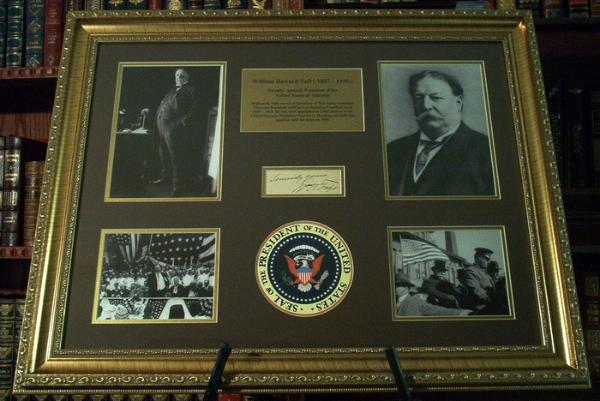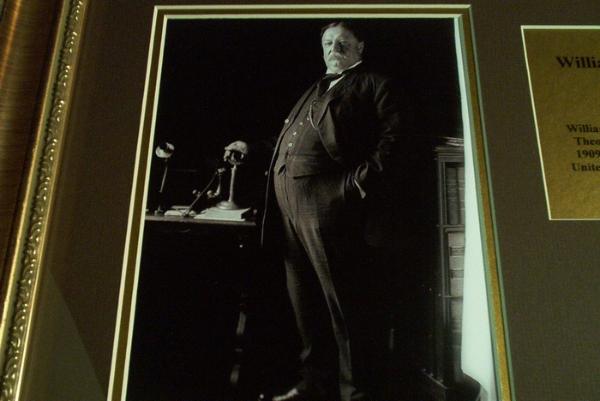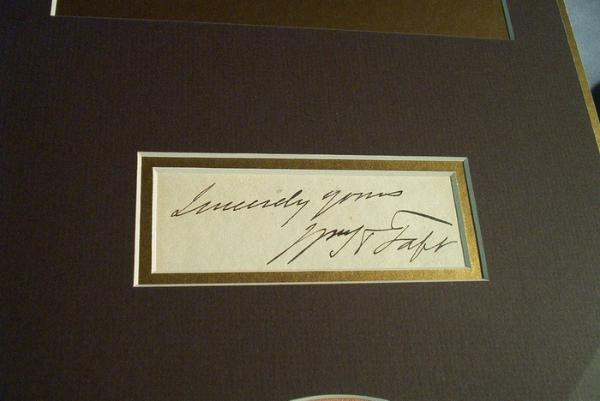Easton Press William H. Taft books
Life and Times of William Taft - 2 volumes - Henry F. Pringle - 1986President William H. Taft biography
William Howard Taft, born on September 15, 1857, in Cincinnati, Ohio, was destined for greatness. He hailed from a family deeply entrenched in the realms of law and politics. His father, Alphonso Taft, was a distinguished attorney and a government official, serving as both Secretary of War and Attorney General under President Ulysses S. Grant. From a young age, Taft exhibited intellectual prowess, graduating from Yale University in 1878, where he excelled academically and was a member of the prestigious Skull and Bones society. Following in his father's footsteps, Taft pursued a career in law, graduating from Cincinnati Law School and eventually establishing himself as a prominent lawyer in Ohio. His expertise and integrity earned him respect and admiration within legal circles, leading to his appointment as a federal judge on the Sixth Circuit Court of Appeals at the age of just 34, making him one of the youngest federal judges in American history.Taft's dedication to public service and his diplomatic acumen soon caught the attention of President Theodore Roosevelt, who appointed him as his Secretary of War in 1904. In this role, Taft successfully reformed the Philippines, laying the groundwork for the islands' eventual independence. His efforts in promoting peace and stability in the region earned him widespread praise. In 1908, William Howard Taft achieved the pinnacle of his political career when he was elected as the 27th President of the United States, succeeding his close friend and mentor, Theodore Roosevelt. Taft's presidency was marked by his commitment to progressivism and trust-busting, as he continued Roosevelt's efforts to rein in the power of monopolies and promote fair competition. One of Taft's most significant achievements was the establishment of the Department of Labor, a testament to his dedication to improving working conditions and advocating for labor rights. Despite facing challenges within his own party and strained relations with Roosevelt, Taft remained steadfast in his convictions, prioritizing the welfare of the American people above all else.
Following his presidency, Taft returned to his true passion: the law. In 1921, he achieved yet another milestone when he was appointed as Chief Justice of the United States Supreme Court by President Warren G. Harding, becoming the only individual in history to have served as both President and Chief Justice. In this role, Taft continued to uphold the principles of justice and fairness until his retirement in 1930. President William Howard Taft's legacy endures as that of a principled leader, dedicated public servant, and staunch advocate for justice and democracy. His contributions to American politics, law, and diplomacy continue to inspire generations, reminding us of the enduring importance of integrity, leadership, and service to others. Taft's unwavering commitment to his principles and his country truly makes him one of the most esteemed figures in American history.
Life and Times of William Taft
Henry F. Pringle's The Life and Times of William Taft stands as a definitive exploration into the complex and multifaceted character of one of America's most consequential leaders. In this meticulously researched biography, Pringle meticulously chronicles the life and career of William Howard Taft, offering profound insights into the man behind the political persona. Pringle begins by delving into Taft's formative years, tracing his upbringing in Cincinnati, Ohio, within a family deeply entrenched in the legal and political spheres. Drawing from extensive archival sources, Pringle paints a vivid picture of Taft's early influences, highlighting the profound impact of his father, Alphonso Taft, a distinguished attorney and government official.Pringle meticulously documents Taft's ascent in the legal profession, from his academic achievements at Yale University to his illustrious career as a lawyer and federal judge. He delves into Taft's tenure as Solicitor General and Governor-General of the Philippines, shedding light on his pivotal role in shaping American policy in the region.
Central to Pringle's narrative is Taft's presidency, which he examines with nuance and depth. Pringle navigates through the complexities of Taft's administration, from his commitment to progressive reforms to his strained relationship with Theodore Roosevelt and the Progressive wing of the Republican Party. Through insightful analysis, Pringle elucidates the challenges and triumphs of Taft's presidency, offering a comprehensive understanding of his leadership style and political legacy. Pringle concludes by exploring Taft's post-presidential years, including his tenure as Chief Justice of the United States Supreme Court. Drawing upon a wealth of primary sources and firsthand accounts, he provides a nuanced portrayal of Taft's enduring commitment to public service and the rule of law.
The Life and Times of William Taft has garnered widespread acclaim for its meticulous research, engaging narrative, and insightful analysis. Pringle's masterful biography offers readers a rich tapestry of Taft's life and times, illuminating the complexities of his character and the enduring relevance of his legacy in American history. In summary, Henry F. Pringle's The Life and Times of William Taft stands as a seminal work, offering a comprehensive and compelling portrait of one of America's most consequential leaders. Through meticulous research and nuanced analysis, Pringle brings Taft's story to life, inviting readers to explore the remarkable journey of a statesman whose impact continues to resonate to this day.
A Conservative's Concept of the Presidency
In William Taft: A Conservative's Concept of the Presidency, Donald F. Anderson delves into the political philosophy and governing principles of the 27th President of the United States. Anderson, a distinguished historian specializing in American conservatism, provides a comprehensive analysis of Taft's presidency, shedding light on his conservative ideals and their impact on the nation. Born into a family deeply entrenched in law and politics, William Howard Taft was raised with a profound respect for tradition, order, and the rule of law. Drawing upon primary sources and extensive research, Anderson paints a vivid portrait of Taft's formative years, exploring the influences that shaped his conservative worldview. Taft's concept of the presidency was grounded in a steadfast commitment to constitutional principles and limited government. Anderson skillfully traces Taft's legal background and his reverence for the Constitution, illustrating how these foundational beliefs guided his approach to governance.Throughout the book, Anderson examines Taft's conservative stance on various policy issues, from economics to foreign affairs. Taft's advocacy for a restrained role of the federal government in the economy is explored in detail, as Anderson analyzes his efforts to balance the interests of business with those of consumers and workers.
In the realm of foreign policy, Taft's doctrine of "dollar diplomacy" takes center stage. Anderson provides a nuanced exploration of Taft's use of economic influence to promote stability and American interests abroad, offering insights into the complexities of his approach and its lasting implications. Anderson's meticulous research and insightful commentary offer readers a deeper understanding of Taft's presidency and its significance within the broader context of American conservatism. "William Taft: A Conservative's Concept of the Presidency" stands as a compelling tribute to one of America's most overlooked conservative leaders, illuminating the enduring legacy of his conservative principles in shaping the presidency and the nation.
William Taft quotes
"Don't write so that you can be understood, write so that you can't be misunderstood."
"Presidents come and go, but the Supreme Court goes on forever."
"Politics, when I am in it, makes me sick."
"The intoxication of power rapidly sobers off in the knowledge of its restrictions and under the prompt reminder of an ever-present and not always considerate press, as well as the kindly suggestions that not infrequently come from Congress."
"Enthusiasm for a cause sometimes warps judgment."
"No tendency is quite so strong in human nature as the desire to lay down rules of conduct for other people."
"Next to the right of liberty, the right of property is the most important individual right guaranteed by the Constitution and the one which, united with that of personal liberty, has contributed more to the growth of civilization than any other institution established by the human race."
"No man can be condemned for owning a dog. As long as he has a dog, he has a friend; and the poorer he gets, the better friend he has."
"One of the greatest delusions in the world is the hope that the evils in this world are to be cured by legislation."
"In the matter of the maintenance and re-establishment of peace, the present epoch is, perhaps, the most momentous in the history of mankind."





Comments
Post a Comment
Share your best book review and recommendation